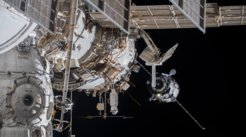New book details the story of ICARUS
Greystone Books, Piper Verlag, and Scribe Publications announce nonfiction book by Martin Wikelski, the founder of ICARUS
Rob Sanders at Greystone Books, Bettina Feldweg at Piper Verlag, and Henry Rosenbloom at Scribe Publications announced today in a joint release that the three companies will publish the first narrative nonfiction book about the International Cooperation for Animal Research Using Space (ICARUS), authored by the Max Planck scientist who founded and leads ICARUS, Martin Wikelski. Greystone is originating the book and will publish in Canada, the U.S., and the UK; Piper will publish in Germany under their imprint Malik; and Scribe will publish in Australia and New Zealand.

Republished with permission from Greystone Books
ICARUS has been heralded as a turning point in “the internet of animals,” a vast network of data with the potential to radically change our understanding of planet Earth as dramatically as the human genome project deepened our understanding of human DNA. Based out of the Max Planck Institute of Animal Behavior in Germany, and partnering with institutions from around the world, Wikelski and a team of international researchers are attaching mini-transmitters to a variety of animal species: from bees to birds to rodents and bats. As animals move about their habitats and migrate around the globe, the new ICARUS transmitters will send digital data to a receiver station in space, which in turn will transmit data to a ground station monitored by ICARUS researchers. All these data are collected in Movebank, an international data archive on individual animal life histories.
With new tools at their fingertips, scientists in the fields of ecology and behavioral research are on the brink of a quantum leap. As animal senses are finely tuned to their environments, the data gained in the internet of animals may enable scientists to develop systems for predicting natural disasters like earthquakes and volcanic eruptions, track the spread of infectious diseases, identify changes in climate, and better protect endangered species. Most data on Movebank will be available for the public to view, offering an intimate picture of the natural world, and rare windows into animal behaviors and habitats.
In his book, Wikelski offers the exciting firsthand account of this scientific breakthrough, including early data and surprising facts about the animals we thought we knew inside-and-out. For example, he describes how large land birds fly nonstop for hundreds of miles over the open ocean––without taking a break for food or rest––by exploiting wind and uplift, even adjusting their migratory routes to benefit from the best conditions. He follows radio-tagged butterflies and dragonflies during their migration, and flies with deathhead hawkmoths crossing the Alps at night. He reveals that some bats take advantage of the wind to fly to altitudes of over 3000 feet on speeds over 99 miles an hour, behavior that was previously known only to birds. He explains that Cape Vultures with wings tagged by conservationists fly slower and shorter distances than those with leg tags, demonstrating a need for further research into how tagging methods impact the behavior and conservation of all bird species. These are just a few of the many revelations of the project, which Wikelski sets in the context of how humans have connected with nature in the past, how this relationship has changed over time, and how modern technology can help humans reconnect to nature and ensure the survival of all life on Earth.
International partners for ICARUS include the University of Konstanz, the Institute of Geography, Moscow, North Carolina State University and Museum of Natural Sciences, the Max Planck-Yale Center for Biodiversity Movement and Global Change, Princeton University, the University of Copenhagen, the Food and Agriculture Organization of the United Nations (FAO), and the International Astronautical Federation (IAF). Sponsors include The Max Planck Society, the Space Administration at the German Aerospace Center (DLR), National Aeronautics and Space Administration (NASA) the Russian Space Agency (Roscosmos), the European Space Agency (ESA), National Geographic, the National Science Foundation (NSF), the German Research Foundation (DFG), UNEP/CMS, the Knobloch Family Foundation, and the Academy for the Protection of Zoo Animals and Wildlife.
About Martin Wikelski
Martin Wikelski is the director of the Max Planck Institute of Animal Behavior based in Radolfzell and Konstanz, Germany, and professor of ornithology at the University of Konstanz. He was educated at the Ludwig Maximilian University of Munich and the University of Bielefeld, followed by postdoctoral studies at the University of Washington and the Smithsonian Tropical Research Institute in Panama. Before becoming a full professor at the University of Konstanz, he was assistant professor at the University of Illinois, Urbana-Champaign and assistant professor then associate professor at Princeton. He lives in Germany.
For more information about ICARUS visit: https://www.icarus.mpg.de/
About Greystone Books
Greystone Books is widely recognized as a leading independent publisher of nonfiction trade books about the natural world, environmentalism, popular science, and health. For more information visit www.greystonebooks.com
About Piper Verlag
Piper Verlag was founded in 1904. It is best known for a wide range of German language and international fiction and non-fiction authors, about half of them in translation, such as Hannah Arendt, Ingeborg Bachmann, Rolf Dobelli, Reinhold Messner, and Stephan Orth. Since 1995 Piper Verlag is part of the Swedish Bonnier Group. The imprint Malik Verlag is widely recognized for its literary travel writing, adventure, mountaineering, and nature list. www.piper.de
About Scribe Publications
Scribe publishes books that matter — narrative and literary nonfiction on important topics, and the best of local, international, and translated fiction. We have offices in Australia and the UK. For more information, visit www.scribepublications.com.au












